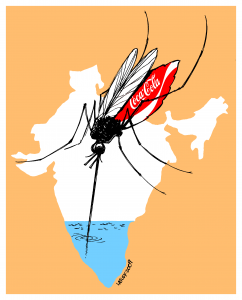
(Wikimedia Commons, 2014)
In February 2017, more than a million traders in India started boycotting Coca-Cola (Doshi, 2017).
Coca-Cola has established their plants in rural India in the 1990’s to take advantage of the low cost water sources (“Coca-Cola and Water Use in India: “Good Till the Last Drop””, 2010) and lax environmental policies (Singh, 2015). Despite the heightened shortage of water and pollution from the plants, this has been ongoing for many years.
As a multinational company, Coca-Cola has announced on multiple occasions that they believe that they have a global responsibility. Coca-Cola has also publicly branded themselves as an environmental and sustainable company.
Our commitments are focused where we have the most opportunity to make a difference — water stewardship, sustainable packaging, energy management and climate protection.
– The Coca-Cola Company (“Environmental Initiatives”, 2012)
By allowing the plants in these water scarce regions, Coca-Cola is countering their own words in making a positive difference through water stewardship. Their actions are not socially beneficial, environmentally responsible or economically sustainable. If there is a difference that was made, it could be stated that it was negative, and directly impacts a large amount of local population from daily life to basic agriculture. It is unethical of Coca-Cola to lie to its consumers to gain more supporters, while their supporters are misled by the company.
Furthermore, it should be questioned if the act of establishing plants in India is ethical. Water is a basic human need, and Coca-Cola has indirectly claimed ownership over the already lacking resource and selling it as a commodity. It should be noted, the water that is taken is not only for the amount of water in each Coca-Cola bottle, but also in the production of the bottle itself, and the sugar in each drink.
It has been generally accepted that food and water should be a basic human right, hence all of the food banks, free water in restaurants and special programs in North America. Coca-Cola in this situation, is directly impeding the locals from obtaining water for their crops producing food, and the clean water that is directly consumable.
Despite the many good reasons that may initiate a boycott in sugary bottled drinks, it is not the reason for the Indian traders. The action of boycotting Coca-Cola stemmed from the rise of nationalism in India. The local brands are still being shelved, it is only the foreign brands that are seen as unhealthy and unethical (Sen, 2017).
This is a very unique event as it is the traders who are boycotting Coca-Cola and not the consumers. Therefore it should also be questioned if the traders should take on this role to limit the freedom of the consumers in purchasing the beverage of their choice.
Word Count: 432
References
Coca-Cola and Water Use in India: “Good Till the Last Drop”. (2010). Science Blogs. Retrieved 12 September 2017, from http://scienceblogs.com/primatediaries/2010/03/11/coca-cola-in-india-good-till-t/
Doshi, V. (2017). Indian traders boycott Coca-Cola for ‘straining water resources’. The Guardian. Retrieved 12 September 2017, from https://www.theguardian.com/world/2017/mar/01/indian-traders-boycott-coca-cola-for-straining-water-resources
Environmental Initiatives. (2012). CocaCola Journey. Retrieved 12 September 2017, from http://www.coca-colacompany.com/stories/environmental-initiatives
Sen, S. (2017). Court restores water supply to Pepsi, Coca-Cola in Tamil Nadu, but retailers ban it. hindustantimes. Retrieved 12 September 2017, from http://www.hindustantimes.com/business-news/ban-of-pepsi-coca-cola-in-tamil-nadu-and-the-rise-of-indian-nationalism/story-oWUjtvUiBc5u4dDg34GCYJ.html
Singh, D. (2015). Coca Cola plant spewing toxic waste near Delhi, green watchdog claims sewerage is leaking into pond near agriculture fields. Daily Mail. Retrieved 12 September 2017, from http://www.dailymail.co.uk/indiahome/indianews/article-3334017/Coca-Cola-plant-spewing-toxic-waste-near-Delhi-Pollution-report-Centre-s-green-watchdog-claims-sewage-leaking-pond-near-agricultural-fields.html
Wikimedia Commons. (2014). CocaColaIndia.png. Retrieved from https://upload.wikimedia.org/wikipedia/commons/1/15/CocaColaIndia.png